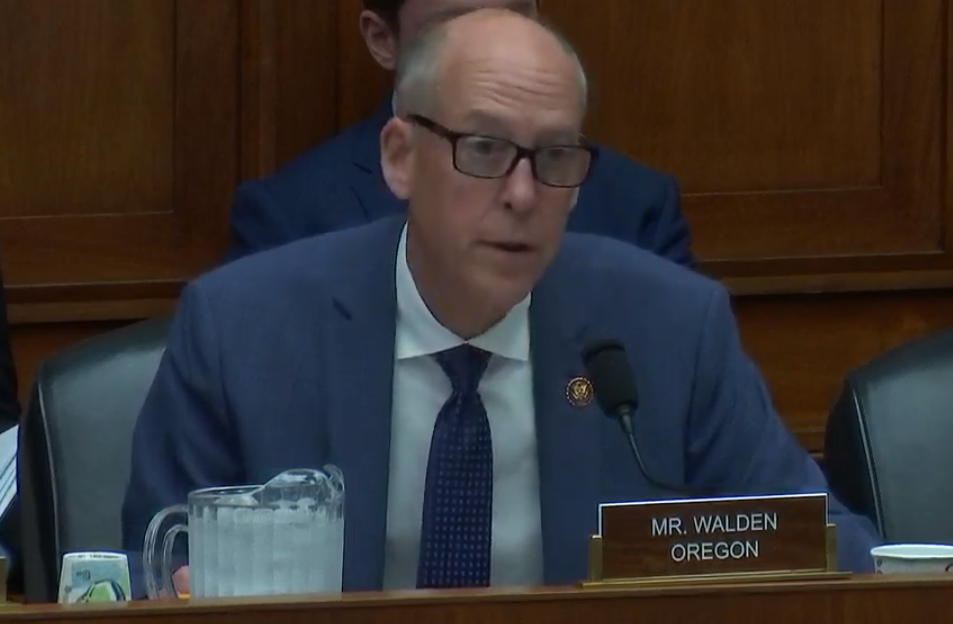Rep. Walden 'On Edge' Over Geolocation Data Sharing

The smarter way to stay on top of the multichannel video marketplace. Sign up below.
You are now subscribed
Your newsletter sign-up was successful
While Democrats were slamming carriers for sharing their geolocation data with third parties, including "bounty hunters" and "stalkers," ranking Republican House Energy & Commerce Committee Chairman Greg Walden (R-Ore.) turned the issue to another knock on edge providers.
That was in a Communications Subcommittee FCC oversight hearing Wednesday, May 15. FCC Chairman Ajit Pai has long said the FCC was investigating the issue, but would not talk about it when pressed by Democrats, pointing out that he does not talk about ongoing investigations.
Related: Pai Tells Hill That FCC Is Not Delaying Geolocation Data
A frustrated Rep. Mike Doyle channeled the late Rep. John Dingell peppering Pai with questions seeking yes or no answers--had carriers stopped sharing location data; whether he had tolled the one-year statute of limitations since it have been over a year. Pai gave neither (though he did say he was "mindful of the relevant statute of limitations"); whether law enforcement agents or members of Congress had had their locations tracked Doyle said that was wholly insufficient and suggested the chairman was "sitting on his hands.
Rep. Anna Eshoo was equally unhappy, pressing Pai on complaints from Democratic commissioners that they could not get info about the status of the investigation either.
Pai did point out that he had offered to let Democrat Geoffrey Starkes oversee the Enforcement Bureau investigation--Starkes said he had turned it down when he was unsatisfied with a briefing he had gotten on the investigation.
But when Walden took the floor, he moved the issue from carriers to content providers pointing out in the process that some geolocation data was consumer-friendly and even life-saving, like emergency roadside assistance.
The smarter way to stay on top of the multichannel video marketplace. Sign up below.
He he shared his Democratic colleagues concern about unauthorized use of consumers' geolocation data. But in a series of questions to a clearly friendly witness (Pai), Walden expanded his concerns. He pointed out that aggregators had been selling data for unauthorized purposes without permission from the carrier or consumer.
He said he understood the FCC's Enforcement Bureau was taking a "deeper dive" into the issue, but that many carriers had already cut off the programs, so they were turning to "the location data collected by tech company's operating systems and apps that were constantly tracking users." He said in many cases that data was even more "pervasive and precise."
He said his concern was that the market for location data was shifting to that relatively unregulated edge.
He asked Pai if the FCC could regulate those aggregators. Pai said no, saying that would typically fall to the Federal Trade Commission. Walden asked if the FCC could look into sharing geolocation data by operating systems and apps. Pai said no, "we don't have jurisdiction over some of the tech giants that have collected that information."
As the former chairman of the Communications Subcommittee and thus a veteran of proceedings where former FCC Chairman Tom Wheeler emphasized that the commission lacked authority over edge practices, Walden was likely confident of those answers.
Contributing editor John Eggerton has been an editor and/or writer on media regulation, legislation and policy for over four decades, including covering the FCC, FTC, Congress, the major media trade associations, and the federal courts. In addition to Multichannel News and Broadcasting + Cable, his work has appeared in Radio World, TV Technology, TV Fax, This Week in Consumer Electronics, Variety and the Encyclopedia Britannica.

